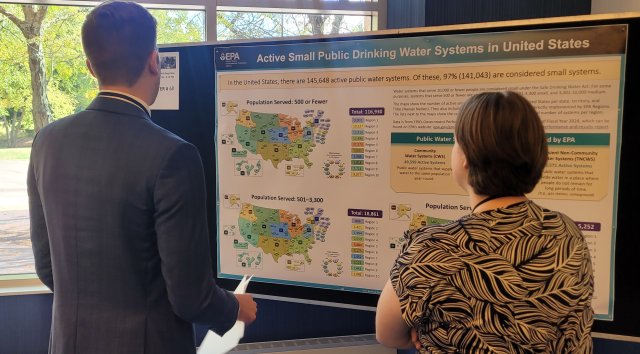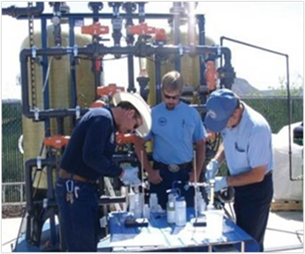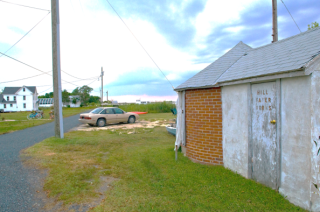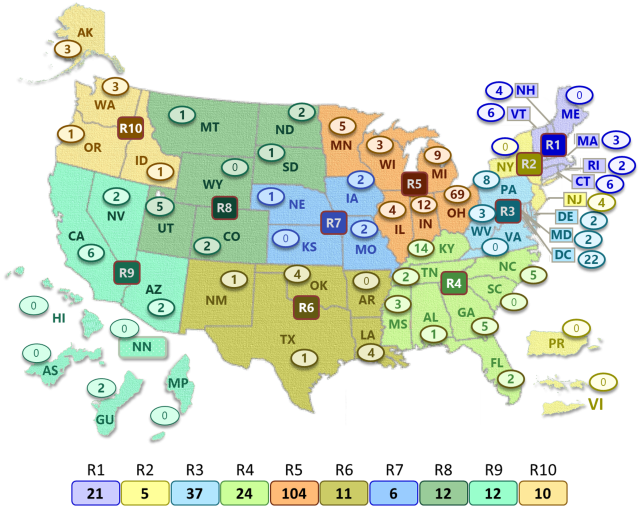21st Annual EPA Drinking Water Workshop: Small System Challenges and Solutions
Focus and Agenda | Participants | Planning Committee | Workshop History | About Small Systems | Resources
Focus and Agenda

The 21st Annual EPA Drinking Water Workshop, which took place on September 17-19, 2024 in Cincinnati, Ohio, was hosted by EPA's Office of Research and Development and Office of Water in partnership with the Association of State Drinking Water Administrators (ASDWA).
The workshop focus was on PFAS and lead (Pb) topics, and was designed for EPA and Tribal, state, and territory government agencies responsible for drinking water regulations compliance and treatment technologies permitting. It provided current technical and regulatory information, resources, and training needed to help in building systems capacity and sustainability and with providing equitable access to drinking water. The focus on specific topics and government agencies allowed EPA and ASDWA to optimize networking, increase engagement, and promote a shared learning experience.
The workshop included technical information sessions, interactive training sessions, breakout group roundtable discussions, topical deep dive and posters session, regional networking session, and other networking opportunities.
Technical session post-workshop webinars
For those unable to attend the workshop, opportunities to benefit from the technical session presentations were provided in a virtual setting as part of the Small Drinking Water Systems Webinar Series. Extended PFAS webinars were held on September 24 and October 29 in 2024 and extended Pb talks were held on December 3, 2024, and April 29, 2025.
- 9/24/2024: PFAS: National Primary Drinking Water Regulation, Occurrence, Analytics, and Risk Communications
- 10/29/2024: PFAS: Rule Implementation and Treatment
- 12/3/2024: Lead Reduction Updates and Lead Service Line Identification (LSLID) and Replacement
- 4/29/2025: Lead Chemistry, Communication, and Local Engagement
Participants
The 2024 workshop was open to EPA; ASDWA; and Tribal, state, and territory agencies responsible for public water systems (primacy enforcement responsibility). There were 242 participants representing these agencies from across the United States.
- Participating state agencies
- Participating territory agencies
- Participating EPA offices and regions
- Participating ASDWA titles
141 participants from 41 state agencies in 40 states
- Alabama Department of Environmental Management
- Alaska Department of Environmental Conservation
- Arizona Department of Environmental Quality
- California State Water Resources Control Board
- Colorado Department of Public Health and Environment
- Connecticut Department of Public Health
- Delaware Health and Social Services
- Florida Department of Environmental Protection
- Georgia Environmental Protection Division
- Idaho Department of Environmental Quality
- Illinois Environmental Protection Agency
- Indiana Department of Environmental Management
- Indiana Finance Authority
- Iowa Department of Natural Resources
- Kentucky Energy and Environment Cabinet
- Louisiana Department of Health
- Maryland Department of the Environment
- Massachusetts Department of Environmental Protection
- Michigan Department of Environment, Great Lakes, and Energy
- Minnesota Department of Health
- Mississippi State Department of Health
- Missouri Department of Natural Resources
- Montana Department of Environmental Quality
- Nebraska Department of Environment and Energy
- Nevada Division of Environmental Protection
- New Hampshire Department of Environmental Services
- New Jersey Department of Environmental Protection
- New Mexico Environment Department
- North Carolina Department of Environmental Quality
- North Dakota Department of Environmental Quality
- Ohio Environmental Protection Agency
- Oklahoma Department of Environmental Quality
- Pennsylvania Department of Environmental Protection
- Rhode Island Department of Health
- South Dakota Department of Agriculture and Natural Resources
- Tennessee Department of Environment and Conservation
- Utah Department of Environmental Quality
- Vermont Department of Environmental Conservation
- Washington State Department of Health
- West Virginia Department of Health
- Wisconsin Department of Natural Resources
2 participants from 1 territory agency
- Guam Environmental Protection Agency
96 participants from 4 EPA program offices and 9 EPA regional offices
- Office of the Administrator
- Office of Enforcement and Compliance Assurance
- Office of Research and Development
- Office of Water
- Regions 1-6 and 8-10
2 participants from ASDWA
- Government Affairs
- Project Management
Planning Committee and Support Team
The workshop was planned by a committee of EPA and ASDWA representatives with a broad range of drinking water technical, regulatory, and communications expertise. The committee is supported by a team contractors to EPA with expertise in event planning and coordination.
Planning Committee Members
EPA Office of Research and Development
- Michelle Latham (Committee Co-Chair), Senior Water Technical Support Coordinator
- Laura Boczek (Committee Co-Chair), Research Microbiologist
- Thomas F. Speth, Senior Science Advisor
- Jonathan Pressman, Drinking Water Treatment and Distribution Branch Chief
- Regan Murray, Water Infrastructure Division Director
- Sandhya Parshionikar, Associate National Program Director for Water Treatment and Infrastructure
- Marie Schneider, Communications Specialist (ORAU contractor to EPA)
- Grace Davis, Research Program Support Specialist (ORAU contractor to EPA)
EPA Office of Water
- Sarah Bradbury, Physical Scientist
- Michael Finn, Environmental Engineer
- Gregory Carroll, Standards and Risk Management Division Associate Director
- Alison Dugan, Environmental Engineer
- Andrew Pizzala, Environmental Protection Specialist
- Alex Horansky, Physical Scientist
EPA Region 8
- Troy D. Hill, Regional Science Liaison
Association of State Drinking Water Administrators
- Kevin Letterly, Government Affairs Manager
- Alan Roberson, Executive Director
Event Planning and Coordination Team
ICF (Contractor to EPA)
- Kaedra Jones, Director
- Sam Whately, Senior Health Science Meeting Planner
- Leah Hennelly, Health Science Conference and Event Coordinator
- Andrew Maresca, Environmental Health Science Researcher
Workshop History

To provide timely information that support the efforts of state and local officials to assist their small systems, EPA’s Office of Research and Development (ORD) and Office of Water (OW), in partnership with the Association of State Drinking Water Administrators (ASDWA), have hosted an in-person annual drinking water workshop in the Cincinnati, Ohio metropolitan area for over 20 years.
The workshop is held in the Cincinnati area because of the large number of staff from EPA’ s ORD and OW that work at EPA’s Andrew W. Breidenbach Environmental Research Center (AWBERC) and lead or support drinking water-focused research, technical assistance, and regulatory efforts. EPA’s AWBERC, located near the Cincinnati Innovation District, is the Agency’s second largest research and development facility and is internationally recognized for water research, bioremediation, and pollution prevention. Because of this, holding the workshop in the Cincinnati area is the most cost-effective location for the Agency and provides workshop participants an opportunity to benefit from engagement and training opportunities with EPA drinking water experts.
When the first workshop was held in 2004, it was by invitation only and designed as an educational opportunity for state staff working with small communities to install arsenic treatment technologies. In 2008, at the encouragement of state agencies, the workshop was opened to the public and expanded to include small drinking water system distribution, water quality, source water, treatment, and operations topics.
As the workshop grew over the years, attendance rose from the 100s to up to the 600s, and some of the sessions were broadcast live as webinars for those unable to attend. In 2020 and 2021, the workshop was held entirely in a virtual platform due to travel restrictions related to the pandemic and had upwards of 3,000 attendees. In 2023, we celebrated the workshop’s 20-year anniversary with close to 400 in-person participants from federal, tribal, state, territory, and local governments; international governments; utilities; non-government organizations; consulting and technical assistance services; academia; private industry; and others.
About Small Systems

There are 145,720 active public water systems in the United States (including territories). Of these, 95% (138,923) are considered small systems under the Safe Drinking Water Act, meaning they serve 10,000 or fewer people.
- Small systems serving 500 or fewer people: 114,928
- Small systems serving 501-3,300 people: 18,753
- Small systems serving 3,301-10,000 people: 5,242
While many of these active small systems consistently provide safe, reliable drinking water to their customers, many face a number of challenges in their ability to achieve and maintain system sustainability. Some of these small system challenges include lack of expertise to choose, operate, and maintain systems; lack of financial resources; aging infrastructure; limited options for residual disposal; and state agencies with limited resources to support the large number of small systems. EPA's research is developing tools, technologies, and approaches to help small systems lower costs and provide safe drinking water now and in the future.
Data is from EPA’s Government Performance and Results (GPRA) Tool (2024 Quarter 1).
Additional Resources
Webinar Series
In addition to this annual workshop, EPA also holds a free monthly webinar series. The Small Drinking Water Systems Webinar Series provides a forum for EPA to communicate directly with drinking water professionals to provide training and foster collaboration and dissemination of information. Beginning in January 2024, some webinars in the series are now being held in partnership with ASDWA.
Webinar topics vary each month and are primarily designed for tribal, state, and territory government agencies responsible for drinking water regulations compliance and treatment technologies permitting. However, others may also benefit from the webinars, including water system operators, technical assistance providers, NGOs, local government personnel, academia, and private sector. This series will continue to provide the latest information on solutions for challenges facing small drinking water systems, but will now be more of an extension of the in-person workshop as it will include presentations that were given during the events. Webinars in this series are typically held on the last Tuesday of the month, from 2 to 3 p.m. ET.

